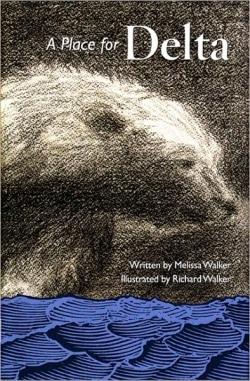A Place for Delta
Although animal adventures are a perennial favorite in juvenile literature, the most notable books are those that stretch beyond the story and truly reach, engage, and teach readers about the world and about themselves. A Place for Delta is such a book. The adventure storyline pairs with meaningful themes, and makes readers aware of world issues without being heavily moralistic.
As children, Ben and Kate, along with their friend Rachel and biologist mother Lisi, explored and learned from the wilderness surrounding their Georgia farmhouse. These experiences have guided Kate into her studies as a wildlife biologist. Now Kate, a graduate student, has asked Ben and Rachel’s son, eleven-year-old Joseph, to join her in Alaska for the summer for a very special assignment. A polar bear cub who Kate names Delta has been orphaned, and Joseph is going to help care for her. While there, Joseph meets Ada, an Eskimo girl native to Alaska, and together they must help uncover the mystery surrounding Delta’s mother’s death, and also figure out, literally, a place for Delta to call home.
Author Melissa Walker is a leader in wilderness preservation, and she has incorporated appreciation of Earth and all its creatures as a major theme of the book. Lisi allows her children and grandchild to explore, both alone and as a family, and teaches them to observe but never intrude on the bears, snakes, salamanders, and other creatures inhabiting the forty acres of wilderness around their home. While this is most clearly shown through the Morse family interactions, Walker continues this message in smaller details and touches, such as observations of the beluga and orca whales in Alaska. It seems as though the novel seeks to help connect children with nature with comments such as “When we’re in the woods, we feel our wildness.”
Walker also includes some of the challenges to preservation, such as hunting and a controversy involving oil companies that may be using deplora-ble methods to get around government regulations. While the consequences of such actions are addressed honestly, the book avoids sounding preachy—a major accomplishment. These serious problems are integrated well and encourage eight–twelve-year-old readers to learn more and effect change. The end of the book even has a list of resources for learning more about Alaska, animals, and preservation. Walker really empowers children by showing how, as Joseph puts it, “kids can do more than some adults think they can.”
The simplicity of Walker’s writing makes the book’s more complex thematic and plot elements approachable. There are some great vocabulary words, and Walker includes a glossary for some of the science terms and other relevant content. Sentences are clear in meaning, but have enough variety and complexity for middle readers. In terms of plot, there sometimes seems to be a little too much for one book (two mysteries, Delta’s growth and care, adventures in the woods, and even a treasure hunt), but the subplots will keep the story interesting for readers, and don’t usually confuse the main storyline.
Perhaps most important is the balance Walker maintains between excitement, danger, adventure, and suitability. While darker elements (such as the sniper targeting polar bears) are tackled, difficult situations are resolved, and there are no graphic details. Although some of the circumstances are a bit unrealistic, (for example, Delta is flown to Georgia in first class, hidden in a crate), this adds enjoyment for the readers. Why should readers, especially at the targeted age range, be denied the satisfaction of solving a fossil-smuggling mystery just because it seems a little too easy? The book has enough realistic, intellectual elements to keep it from being patronizing, and allowing the readers to enjoy the book will encourage a love of reading.
A Place for Delta would have been a sweet, appealing story based on the root plot alone. Layered with ethical and moral ideas and evocative themes, the book becomes a more creative, more unique, and ultimately more inspiring work for readers of all ages.
Reviewed by
Alicia Sondhi
Disclosure: This article is not an endorsement, but a review. The publisher of this book provided free copies of the book to have their book reviewed by a professional reviewer. No fee was paid by the publisher for this review. Foreword Reviews only recommends books that we love. Foreword Magazine, Inc. is disclosing this in accordance with the Federal Trade Commission’s 16 CFR, Part 255.

